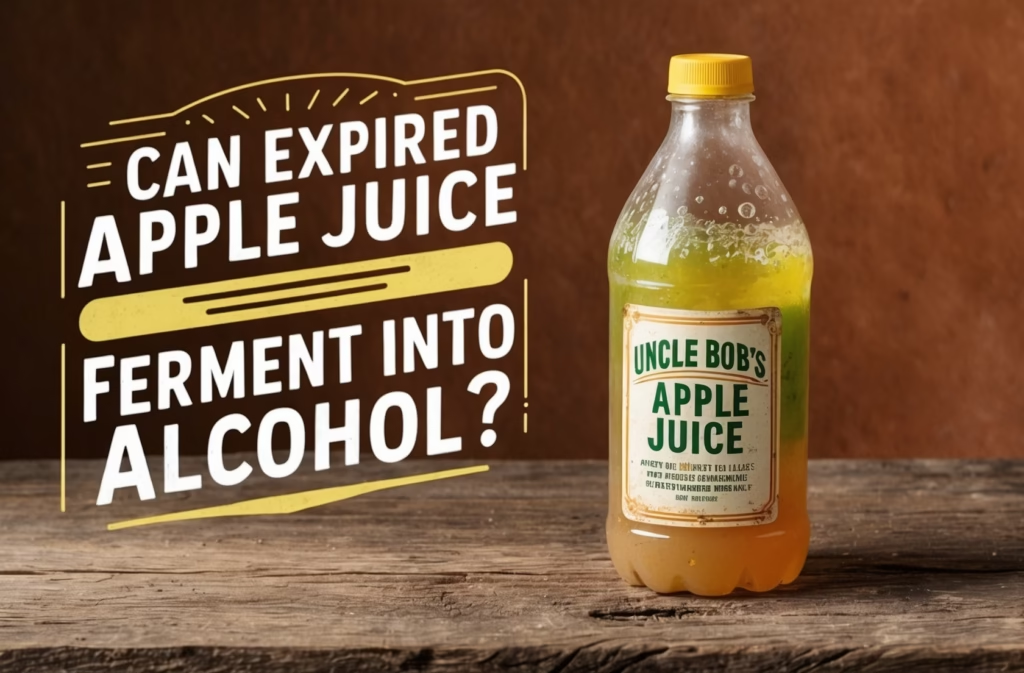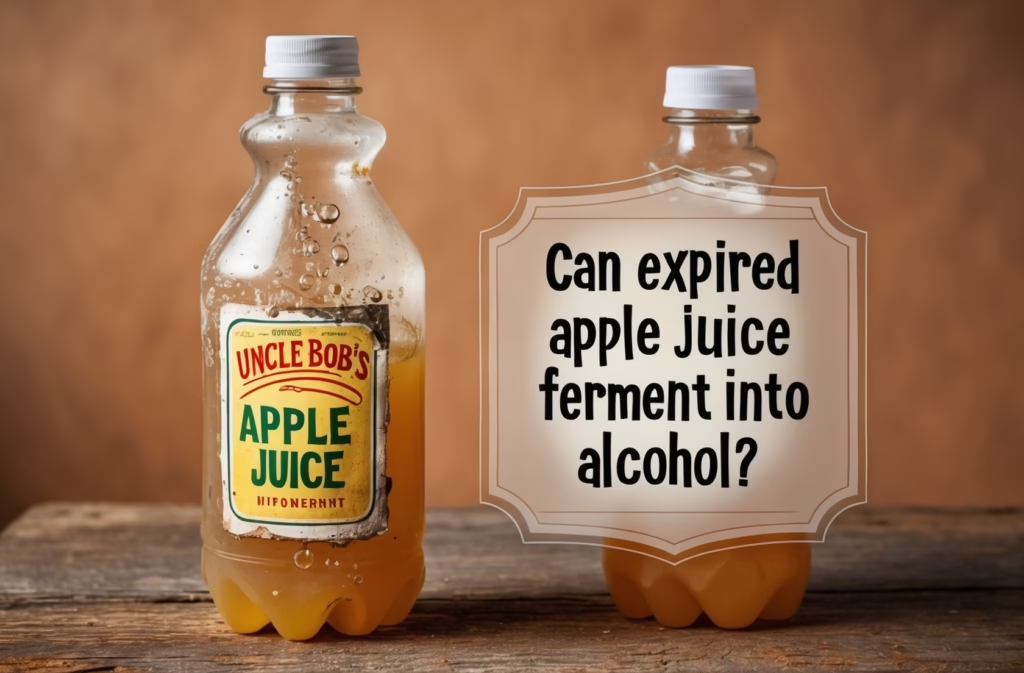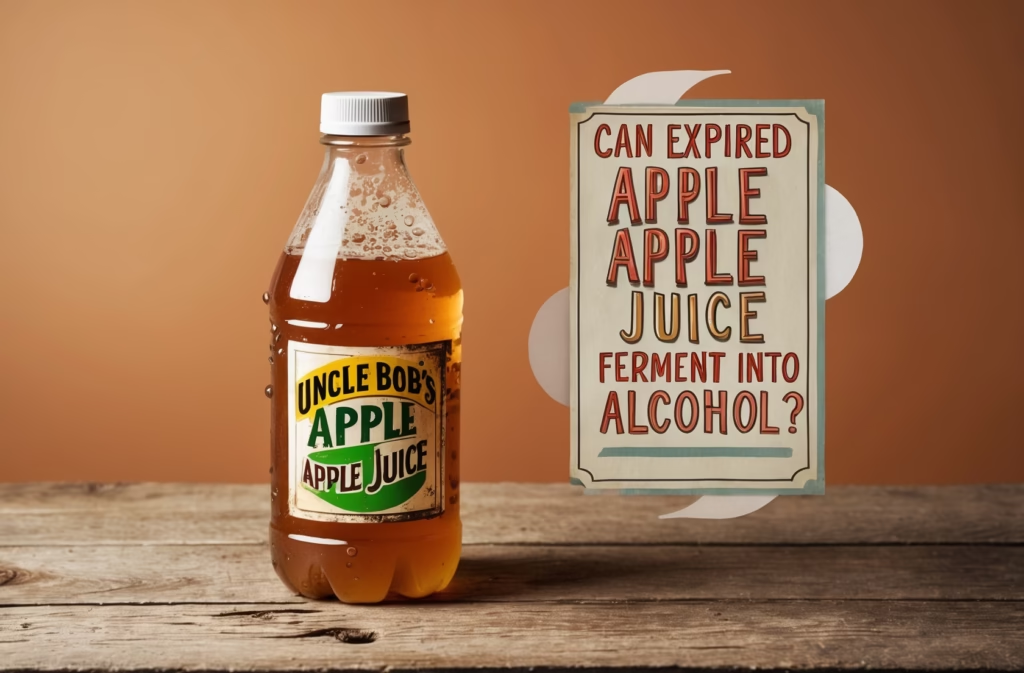Can You Get Drunk Off Of Expired Apple Juice? Find out if expired apple juice can ferment and produce alcohol. Learn about expired apple juice alcohol and apple juice fermentation alcohol. Discover the truth!
Can You Get Drunk Off Of Expired Apple Juice?
The question, Can you get drunk off of expired apple juice? sparks curiosity and maybe even a bit of concern. The short answer is: potentially, yes, but it’s highly unlikely and far from a guaranteed outcome. Let’s delve into the science behind this intriguing possibility, exploring the concept of expired apple juice alcohol and the process of apple juice fermentation alcohol.
Understanding Apple Juice Fermentation and Alcohol Production
Apple juice, like many fruit juices, contains natural sugars. These sugars are the key ingredient in the alcoholic fermentation process. When yeast, naturally present in the environment or introduced through contamination, comes into contact with these sugars, it begins to break them down. This process, known as fermentation, produces ethanol, which is the type of alcohol that makes you drunk. The byproduct of this process is also carbon dioxide, which is why fermented drinks often fizz.
However, commercially produced apple juice undergoes pasteurization, a heat treatment designed to kill harmful bacteria and yeast. This significantly reduces the chances of fermentation occurring. This is why fresh, store-bought apple juice usually doesn’t contain alcohol. But what about expired apple juice?
Expired Apple Juice: A Breeding Ground for Microbes?
The best by date on apple juice indicates the peak quality and flavor, not necessarily the point at which it becomes unsafe. However, once the packaging is opened, the juice is exposed to air and other microorganisms. If yeast finds its way into the expired juice, fermentation can begin. The longer the juice sits after its expiration date, the higher the chance that this will happen. The extent of fermentation depends on several factors: the amount of residual sugar, the type and quantity of yeast present, temperature, and oxygen exposure.
For instance, if you enjoy a refreshing glass of green apple juice or a more exotic blend like pineapple apple juice, and leave the opened carton for several weeks in a warm environment, the chances of fermentation are significantly higher. The same applies to other variants, including raspberry apple juice, apple cucumber kale juice, or even apple orange carrot juice. The higher the sugar content, the greater the potential for alcohol production.
Factors Affecting Alcohol Production in Expired Apple Juice
Several factors determine whether significant apple juice fermentation alcohol will develop in expired juice:
- Time: The longer the juice remains unrefrigerated after the expiration date, the more time yeast has to work its magic.
- Temperature: Yeast thrives in warmer temperatures. A warm environment accelerates the fermentation process.
- Exposure to Air: Oxygen is needed for yeast to initially grow, so a partially filled and open container will facilitate fermentation.
- Type of Apple Juice: The sugar content of the juice plays a significant role. Juices with higher sugar concentrations will produce more alcohol.
- Initial Yeast Population: The number of yeast cells present at the beginning of the process will influence the rate of fermentation.
The Dangers of Drinking Fermented Expired Apple Juice
While the prospect of accidentally getting drunk on expired apple juice might seem amusing, it’s crucial to understand the potential risks. Home-fermented beverages are not subject to the same quality control measures as commercially produced alcoholic drinks. This means that the alcohol content is unpredictable, and potentially harmful bacteria or other microorganisms may also be present. Drinking such juice could lead to:
- Intoxication: The level of alcohol could be unexpectedly high, leading to alcohol poisoning.
- Foodborne illness: Harmful bacteria present in the fermented juice could cause gastrointestinal distress, such as vomiting, diarrhea, and stomach cramps.
- Unpleasant taste and smell: Fermentation often results in off-flavors and a vinegary or sour smell.
Is it Worth the Risk? A Safer Approach to Enjoying Apple Juice
The possibility of expired apple juice alcohol is real, but the risks far outweigh the rewards. While it’s unlikely to produce a potent alcoholic beverage, the potential for food poisoning and unpredictable alcohol content makes consuming expired apple juice a risky proposition. It is far safer to discard expired apple juice and purchase a fresh bottle. Proper storage and timely consumption are crucial to ensure the quality and safety of your apple juice.
For further information on food safety and spoilage, you can consult resources from reputable organizations like the FDA: Food and Drug Administration Their website provides valuable guidance on food safety best practices.
Additionally, the Centers for Disease Control and Prevention offers excellent resources on foodborne illnesses and how to prevent them.
In Conclusion: Proceed with Caution
While you can potentially get drunk off expired apple juice due to the process of apple juice fermentation alcohol, it’s extremely unlikely and comes with significant health risks. Don’t risk it! The unpredictable alcohol content and potential for harmful bacteria make it far safer to simply discard expired apple juice and enjoy a fresh, safe bottle instead. Remember, the best by date is there for a reason.
Have you ever experienced anything similar? Share your thoughts and experiences in the comments below. Let’s discuss your encounters with expired apple juice alcohol or other related occurrences of unintentional fermentation!

Frequently Asked Questions: Expired Apple Juice and Alcohol
- Can You Get Drunk Off Of Expired Apple Juice?
- It’s unlikely. While expired apple juice can ferment and produce a small amount of alcohol, the concentration is usually far too low to cause intoxication. The level of ‘Expired Apple Juice Alcohol’ would be insignificant.
- How does apple juice become alcoholic?
- Apple juice contains natural sugars. Yeast, present in the air or naturally occurring in the juice, can ferment these sugars, producing ‘Apple Juice Fermentation Alcohol’ (ethanol). This process is accelerated by warmth and time, which is why expired juice is more likely (but still unlikely) to show fermentation.
- Does expired apple juice always contain alcohol?
- No. Fermentation depends on several factors, including the presence of yeast, temperature, and the length of time the juice has been past its expiration date. Many expired juices show no significant ‘Expired Apple Juice Alcohol’ content.
- How much alcohol is in expired apple juice?
- The alcohol content, if any, is typically very low, often well below the levels needed for intoxication. It’s difficult to predict without testing; the amount of ‘Apple Juice Fermentation Alcohol’ varies greatly.
- Is drinking expired apple juice safe?
- Even if it contains a small amount of ‘Expired Apple Juice Alcohol’, consuming expired apple juice is not recommended. It may contain harmful bacteria or molds that could cause illness.
- What are the signs of fermented apple juice?
- Signs might include a fizzy or bubbly appearance, a sour or vinegary smell, and a change in taste. However, the absence of these signs doesn’t guarantee the absence of ‘Apple Juice Fermentation Alcohol’.
- Can I use expired apple juice for cooking?
- No. Expired apple juice should not be used in cooking due to the potential presence of harmful bacteria or other microorganisms. It’s best to err on the side of caution.
- Can you get sick from drinking expired apple juice?
- Yes, you can. Expired apple juice is more likely to contain harmful bacteria and molds which could cause food poisoning and other illnesses, independent of the ‘Expired Apple Juice Alcohol’ content.
- What is the difference between fermentation and spoilage?
- Fermentation is a specific type of spoilage caused by yeast converting sugars into alcohol and carbon dioxide. Spoilage can also result from bacterial growth causing other undesirable changes and potential toxins, making expired apple juice unsafe.
- Is there a way to test expired apple juice for alcohol content?
- While home testing kits exist, they may not be precise enough for accurately measuring trace amounts of ‘Apple Juice Fermentation Alcohol’. A professional lab test would provide the most accurate results.

Can You Get Drunk Off Of Expired Apple Juice? Uncorking the Truth About Apple Juice Fermentation
The question, Can you get drunk off of expired apple juice?, is a fascinating one that delves into the world of fermentation and the surprising potential of seemingly innocuous beverages. While fresh apple juice isn’t alcoholic, the answer is a nuanced yes, but with significant caveats. Let’s explore the science behind expired apple juice alcohol and the factors influencing its alcoholic content.
Expired Apple Juice Alcohol: The Fermentation Process
The key to understanding how expired apple juice can become alcoholic lies in the process of fermentation. Apple juice, like many fruit juices, contains natural sugars. These sugars provide the perfect food source for yeast, naturally occurring microorganisms present in the environment or already on the fruit’s surface. When exposed to air, yeast consumes these sugars, converting them into ethanol (alcohol) and carbon dioxide as byproducts. This process is accelerated in warmer temperatures and slowed or stopped in colder temperatures. The longer the juice sits, particularly in a warm environment, the more time the yeast has to ferment the sugars, resulting in a higher alcohol content.
The amount of alcohol produced depends on several factors. The sugar content of the original apple juice plays a significant role; a sweeter juice like pineapple apple juice will potentially yield more alcohol than a tart juice like green apple juice. The type and quantity of yeast present also influence the fermentation process and the final alcohol concentration. Additionally, the presence of preservatives or pasteurization can inhibit or completely prevent fermentation. Pasteurized juice, for example, is much less likely to ferment as the heat treatment kills most of the naturally occurring yeasts.
Apple Juice Fermentation Alcohol: Factors Affecting Alcohol Content
Several factors influence whether expired apple juice will become alcoholic and to what degree. These include:
- Initial sugar content: Higher sugar content means more potential alcohol.
- Exposure to air: Yeast needs oxygen to initiate fermentation, so an airtight container will slow down the process.
- Temperature: Warmer temperatures accelerate fermentation.
- Presence of yeast: The type and amount of yeast present impact the efficiency of fermentation.
- Preservatives and pasteurization: These inhibit or prevent fermentation.
- Container type: A container that allows the escape of carbon dioxide will also impact the final alcohol content.
It’s important to note that even if fermentation occurs, the resulting alcohol content is unpredictable and may be low. It’s impossible to reliably determine the alcohol concentration without laboratory testing. Drinking expired apple juice, even if it has undergone fermentation, carries risks. The fermentation process itself can lead to the production of harmful byproducts, and the absence of quality control means you don’t know what else might be growing in the liquid.
Is It Safe to Drink Expired Apple Juice? A Word of Caution
The short answer is: no. Even if you’re curious about the alcohol content after considering “Can you get drunk off of expired apple juice?”, drinking expired apple juice is strongly discouraged. Beyond the potential for alcohol, spoiled apple juice can harbor harmful bacteria and toxins that can cause significant gastrointestinal distress. This is especially true if the juice was not properly refrigerated, and has spent time at room temperature.
For a healthier and more controlled way to enjoy the benefits of apples, try a refreshing juice blend like apple, orange, and carrot juice or add them to a delicious salad like a Waldorf Salad recipe (although note that is a separate recipe).
The potential health risks associated with consuming expired apple juice far outweigh any curiosity about its potential alcohol content. To learn more about food safety guidelines, consult reputable sources like the FDA: FDA Food Safety Guidelines.
Another great alternative is a refreshing apple, cucumber, and kale juice which is far healthier and tastier than any potentially harmful fermented apple juice.
For other delicious apple juice recipes, consider exploring blends like raspberry apple juice that offer a burst of flavor without the risks associated with expired juice.
Recipe: Safe and Delicious Apple Juice Blend
This recipe showcases the delightful versatility of fresh apple juice without the risks of consuming expired juice. Enjoy a refreshing and healthy beverage without the uncertainty.
Ingredients:
- 1 cup fresh apple juice
- ½ cup orange juice
- ¼ cup carrot juice
- 1 tablespoon lemon juice
- ½ teaspoon grated ginger (optional)
- Ice cubes
Instructions:
- Combine all ingredients in a blender.
- Blend until smooth.
- Pour into a glass filled with ice.
- Serve immediately and enjoy!
Nutrition Table
Note: Nutritional values are estimates and may vary depending on the specific ingredients used.
| Nutrient | Amount per Serving | % Daily Value (DV) |
|---|---|---|
| Calories | 150 | 8% |
| Protein | 1g | 2% |
| Fat (Total) | 0g | 0% |
| Fat (Saturated) | 0g | 0% |
| Fat (Unsaturated) | 0g | 0% |
| Fat (Trans) | 0g | 0% |
| Carbohydrates | 38g | 13% |
| Sugar | 30g | N/A |
| Fiber | 1g | 4% |
| Vitamin C | 50mg | 55% |
| Potassium | 200mg | 6% |
| Vitamin A | 100 mcg | 11% |
| Calcium | 10mg | 1% |
| Iron | 0.5mg | 3% |
Summary of Nutritional Features
This refreshing apple juice blend provides a good source of Vitamin C, potassium, and Vitamin A. It is relatively low in calories and fat, making it a healthy addition to your diet. Remember that these values are estimates, and the exact nutritional content will depend on the specific ingredients and their quality.
Call to Action
Ready to experience the vibrant flavors of a safe and delicious apple juice blend? Try this recipe today! Share your creations on social media using #AppleJuiceBlend #HealthyDrinks #FreshJuice and let us know your thoughts in the comments below! We’d love to hear about your experience and any creative variations you come up with!
For further reading on the safety and handling of fruit juices, consult the following reputable resources:Eat Right, USDA Food Safety and Inspection Service

Can You Get Drunk Off Expired Apple Juice?
No, you cannot get drunk from expired apple juice. Apple juice, regardless of its expiration date, does not contain alcohol. Alcoholic beverages are produced through fermentation, a process that converts sugars into alcohol. Apple juice, while containing natural sugars, does not undergo this fermentation process during typical commercial production or home storage. The expiration date indicates when the juice is likely to be at its best quality in terms of flavor and nutritional value, not when it becomes alcoholic.
However, it’s crucial to understand that consuming expired apple juice can present other health risks. Spoiled juice can harbor harmful bacteria and microorganisms that cause foodborne illnesses, leading to symptoms like nausea, vomiting, and diarrhea. The longer apple juice sits past its expiration date, especially if improperly stored, the higher the risk of bacterial contamination. Consider the refreshing taste of a fresh juice like this green apple juice, free from the risks associated with expired beverages.
Instead of risking illness from consuming expired juice, it’s always best to discard it. If you’re looking for a delicious and healthy alternative, try a blend like pineapple apple juice or a more complex concoction such as apple cucumber kale juice. These recipes provide a refreshing and nutritious drink, and importantly, they are free of the risk of spoilage.
The potential for bacterial growth increases significantly after the expiration date. These bacteria can produce toxins that can cause serious illness. Even if the juice doesn’t look or smell noticeably spoiled, it’s advisable to err on the side of caution. A better choice would be to make a fresh juice at home, like raspberry apple juice or a vibrant apple orange carrot juice.
In short, while you can’t get intoxicated from expired apple juice, consuming it poses a real risk to your health due to potential bacterial contamination and food poisoning. Always check expiration dates and discard any juice that has passed its best by date.